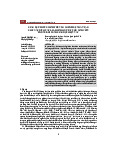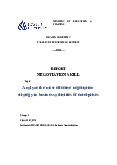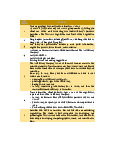




Preview text:
Hoa Sen University
Vatel Program - Hotel & Tourism Business School ASSIGNMENT OF NEGOTIATION NGO 301
Student: TRAN THANH PHAT Class: MD3-2020 Due date: Dec 12 2022 VATEL HO CHI MINH EXAM PAPER CODE: NGO301 SUBJECT: NEGOTIATION 1st SEMESTER NEGOTIATION ASSIGNMENT
Prepared by: Dr. Rob Lock
Assign project work (1200 words) relating to any or all of the following–
a) Aristotle’s 3 pillars of negotiation.
b) Cartesian principles in negotiation.
c) Machiavelli and the art of deception in negotiation.
d) Sun Tzu’s Five Elements in Negotiation.
e) The Fog of War and asymmetric information in negotiation.
This assignment was written according to Option A, Aristotle’s 3 Pillars of Negotiation.
More than 2,000 years ago, Aristotle outlined the formula for mastering the art of persuasion in his
work “Rhetoric”. Many great communicators have used it over the years to deliver the most
impactful speeches and presentations and share their ideas in negotiations.
Among them, it is impossible not to mention former US President Donald Trump, one of the people
who made a great contribution to developing the US economy during the time he hosted the
presidency. That has shown how understanding Aristotle's 3 pillars of negotiation principle will make
the negotiation take place successfully. That's why this assignment will analyze Aristotle's 3 pillars
of negotiation and also show what Aristotle can teach people about how to use them in a negotiation.
So what are the elements of Aristotle's rhetoric? Basically, there are five elements based on
Aristotle's Rhetoric, but these three are the most widely applied and best known. It even has its own
name, "Aristotelian's Rhetorical Triangle". It consists of three elements, which are:
- Ethos (about Credibility and Trust elements)
- Logos (about Consistency and Logic elements)
- Pathos (about Emotions and Imagination elements, it shows how to meet emotional of audience)
Ethos is the part of a negotiation speech that plays a role in building the audience's credibility with
the presenter. Aristotle believed that if speakers did not provide evidence for their speech, they would
lose credibility, and eventually, the argument would weaken.
For example, in a now popular TED Talk about reforming the criminal justice system, Human Rights
Attorney Bryan Stevenson began with: "I spend most of my time in prisons, prisons, and in solitary
confinement camps for death row inmates. Most of the time I live in extremely low-income
communities on projects and places where everything seems hopeless." You'll notice that Stevenson
doesn't list degrees, achievements, and awards like a resume. Instead, he just sketched the character's
personality for the audience sitting below, who didn't know anything about him. In this way, he was
able to successfully build a foundation of trust between himself and those who listened to him.
Humans all find it difficult to find a reason to trust others, or ancestors had the ability to instantly
determine whether a stranger was a friend or foe. If presenters can make a commitment to the welfare
of others, they will build credibility even before they begin to question the other party in a negotiation.
That's why Ethos is the embodiment of credibility, accumulated over time by behavior and work.
Aristotle believed that, if someone regularly acted contrary to their word, their argument would be
completely unconvincing. So in negotiation, if someone often acts contrary to their words, even if
they have a high position and a lot of experience, their negotiation skill will no longer be convincing
to the opponent. So it is always believed that, when making a first impression in a negotiation, it is
even more important to accumulate and maintain this trust during the conversation as well as the work after it.
Logos, this element can be understood as logic and reasoning in negotiation. Once you have gained
the trust of the other party in a negotiation, the next factor is necessary to convince the listener. In a
negotiation, the crucial thing is using more numbers, data, and evidence to add persuasiveness to
your argument. In today's data-driven era, no matter how sharp the reasoning is, the lack of specific
data seems to affect each individual's decision more or less.
There are two caveats when applying this one. First, these arguments need to emphasize the benefit
to the listener. Showing a huge amount of information, associated data index is not enough. The key
points are the information that talks about the benefits brought to the listener. Negotiators have to ask
themselves what the idea they are presenting will help the listener make a profit, then the
presentation will be considered perfect. Second, the negotiator needs to determine, of the useful
information provided above, which is the information the other side needs the most. Negotiators need
to refine the message according to the needs of the listener. Ask why the audience is interested in this
issue. Simply put, people only really pay 100% of their attention when they hear the information they are interested in.
Pathos, according to Aristotle, makes it impossible to persuade someone without emotion. There is a
very beautiful phrase: "storytelling." Aristotle believed that the best way to convey emotions from
one person to another was to tell a story. A compelling story stimulates the release of the brain
chemical oxytocin. It will help people become more emotional, and then decision-making will be easier and faster.
According to Aristotle, negotiation happens successfully when the stories that make the best
connections always have a plot. It could be about individuals or people close to them, or it could be
about failure, bad luck, danger, or disaster... But that just needs to be a true story. And when told
honestly, it creates a deeper connection. Stories that are personal are more likely to be liked and cared for by listeners.
In an analysis of over 500 TED Talk presentations, it was found that plot (the Pathos factor) makes
up 65% of the talk. Meanwhile, Logos, which is only about the logic in the speech, accounts for only
25%, and Ethos only accounts for 10%. In other words, the formula for success in negotiation is the
idea of a story. Therefore, when negotiating, people will tend to tell stories about related areas that
make the other party feel interested and want to be more interested in what they say in the negotiation.
However, Aristotle's three pillars of negotiating have three vertices. As it is called a triangle, it must
have three vertices. It can be an equilateral triangle, an isosceles triangle, etc., depending on the
person presenting in the negotiation and the material they have and use. But since it's a triangle, it has
to have three vertices to stand.
In conclusion, negotiating with anyone is not simple at all. However, once the principles of rhetoric
are applied in the initial planning step, the chances of successful negotiating increase dramatically. In
a negotiation, the listener needs to be convinced that the speaker is trustworthy—someone who
understands them and knows what they want. And they want to hear logical arguments. These are the
three pillars of the Rhetorical Triangle, and everyone must consider them when making effective
arguments and arguments. Make certain that the communication used when negotiating balances all
three factors. Only the negotiation has a chance to succeed, and more importantly, the listener must
understand what the speaker wants to say. When presenters are willing to learn how to deliver a
message that meets all of these elements, they are one step ahead of the audience before the audience
opens up about their concerns.




